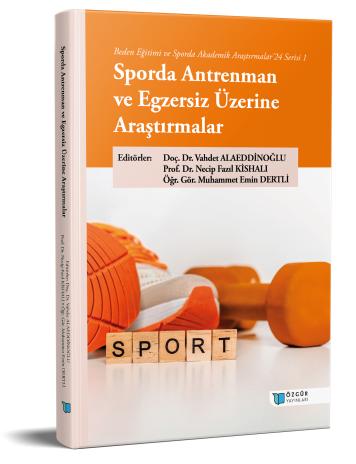
Egzersizde Protein Sentezi ve Etkileyen Faktörler
Şu kitabın bölümü:
Alaeddinoğlu,
V.
&
Kishalı,
N.
F.
&
Dertli,
M.
E.
(eds.)
2024.
Sporda Antrenman ve Egzersiz Üzerine Araştırmalar.
Özet
Vücudun metabolik, mekanik ve biyolojik birçok işlevinin yürütülmesinde görev alan iskelet kasları, enerji tüketimi, hareket ve iyileşme süreçlerine katkı sağlamaktadır. Kaslar, glikoz metabolizması, enerji homeostazı, dolaşım düzenlemesi ve metabolik gen ekspresyonunun kontrolünde kritik rol oynamaktadır. Ayrıca, kaslar miyokinler salgılayarak endokrin sistemle etkileşime girip, bu mekanizma aracılığıyla yağ dokusu, karaciğer, pankreas gibi organlarla metabolik dengenin sağlanmasına katkıda bulunmaktadır. Yaş, beslenme ve fiziksel aktivite düzeyi kas kütlesi üzerinde doğrudan etkiye sahiptir. Yaşlanma, yetersiz fiziksel aktivite ve kötü beslenme gibi faktörler, kas kütlesinde azalmaya yol açabilir; bu da insülin direnci, obezite ve metabolik bozukluklar gibi sorunlara zemin hazırlayabilir. Kas kütlesinin korunması için direnç egzersizleri ve aerobik aktiviteler büyük önem taşımaktadır. Direnç egzersizleri, protein sentezini artırarak hipertrofiye ve fonksiyonel iyileşmeye katkıda bulunur. Aerobik egzersizler ise uzun vadede kas kaybını azaltır ve enerji metabolizmasını destekler. Bu egzersizlerin etkili olabilmesi ve kasların yeniden yapılanma ve onarımı için yeterli ve kaliteli protein alımı gereklidir. Protein gereksinimi belirlenirken, protein kalitesi ve biyolojik değerinin vücut proteini üzerindeki etkisi göz önünde bulundurulmalıdır. Sporcuların beslenmesinde, kas protein sentezini optimize etmek için doğru protein türü, miktarı ve zamanlaması önemlidir. Özellikle egzersiz sonrası dönemde protein alımı kas gelişimini hızlandırmaktadır. Ayrıca, karbonhidratlar da sporcular için enerji kaynağı olarak önemli olup, protein alımının yanı sıra doğru karbonhidrat alımı da kas kütlesi korunumu ve enerji gereksinimlerinin karşılanması açısından kritik rol oynar. Bu faktörlerin doğru zamanlaması, performans artışı ve kas kazanımına katkı sağlamaktadır. Protein sentezi, IGF-1 ve mTOR sinyal yollarıyla düzenlenirken miyostatin gibi protein yıkımını artırıcı faktörlerin kontrol altına alınması önemlidir. Dinlenme, özellikle de uyku, kas protein sentezinin sürdürülmesi ve toparlanma için gereklidir. Uyku öncesi protein alımının, kas yapımını destekleyici etkileri bilimsel olarak kanıtlanmıştır. Özellikle yaşlı bireylerde, uyku öncesi protein alımıyla sağlanan iyileşme, kas kaybını engelleyebilmektedir. Egzersiz, beslenme ve dinlenme süreçlerinin dengeli bir şekilde yönetilmesi, kas sağlığı ve genel fiziksel dayanıklılık için vazgeçilmez bir stratejidir.

